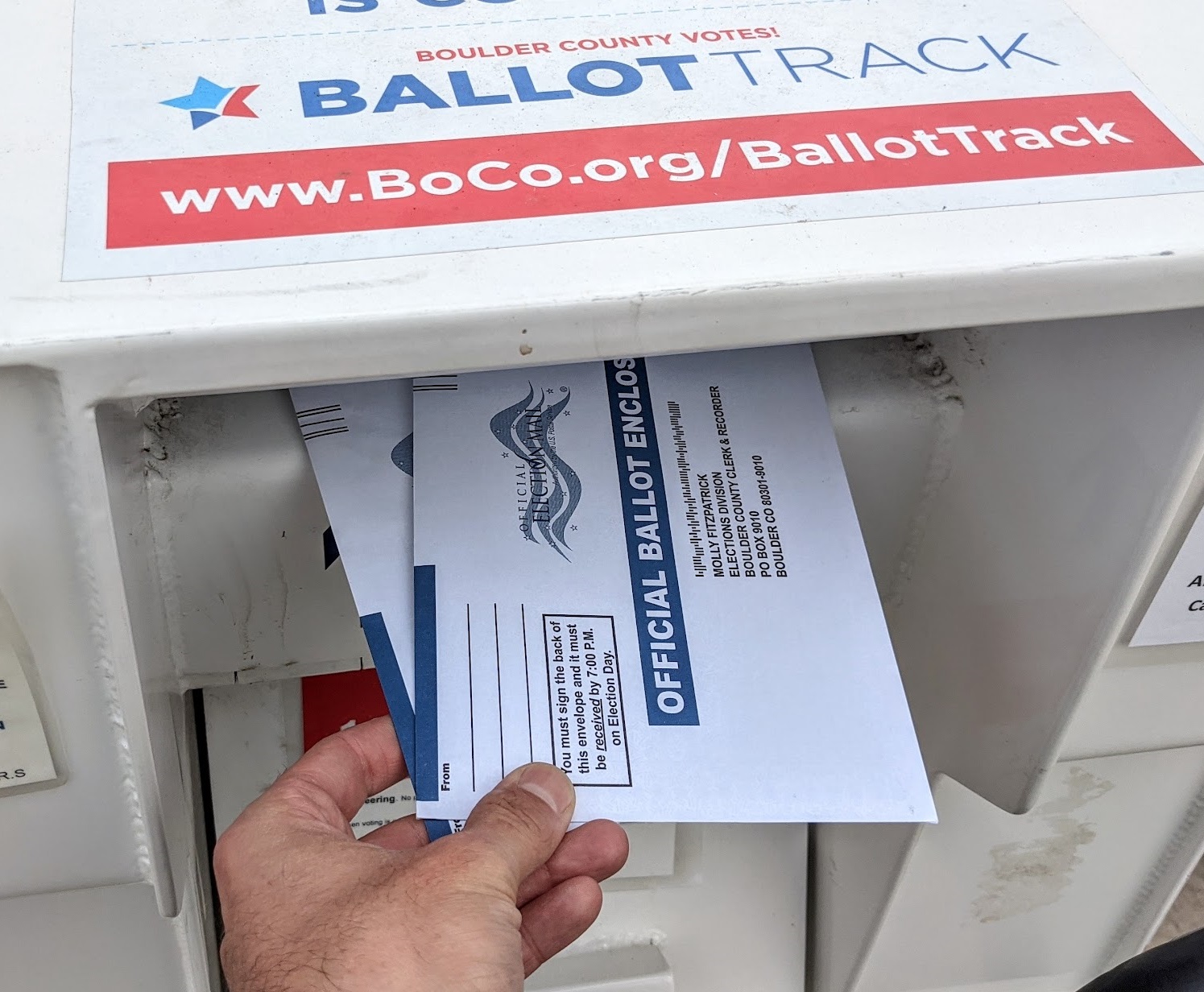Opinion: Yes on 2E: To broaden democracy, broaden the vote.

Tuesday, Oct. 18, 2022
Learn more about 2E: Change regular municipal elections to even years
Get a second opinion: No on 2E: Keep the focus on local issues
By Aidan Reed
Opponents of democracy are on the march at home and abroad. From right-wing victories in Sweden, Hungary and Italy to the primary election victories of 2020 election deniers in the U.S., hostility toward representative liberal democracy is rising at an alarming rate.
One of the best ways to safeguard democracy is to make it easier for people to participate in it. Democratic participation involves more than voting, but voting is one of the most important and impactful ways for average people to have a measurable impact on the decisions shaping their lives.
Boulder Ballot Question 2E proposes moving city council and mayoral elections from odd years to even years so that they coincide with state and federal elections. Passing 2E is a crucial step toward improving voter turnout and engagement in Boulder. For example, Boulder election data indicate that voter turnout in odd-year elections drops significantly compared to even-year turnout, particularly among people under the age of 30.
| Voter turnout of under-30-year-olds in Boulder by year: | |
| 2020 | 17,280 |
| 2021 | 5,106 |
That off-year drop off is even more acute when scaled for all of Boulder. 90% of registered voters turned out in 2020, followed by a rather paltry 49% turnout in 2021.
Not only are young people less likely to vote in odd years, but so are people of color. In 2020, turnout among voters of color across the 10 most racially diverse Boulder precincts hovered between roughly 70% and 90%. By contrast, turnout among those same precincts in 2021 was between 10% and 48%.
Boulder is an overwhelmingly white city, meaning that electoral representation among people of color is proportionally quite small even with the best turnout. Even-year elections are more diverse and see greater turnout among young people, making them more representative of the electorate’s interests than odd-year elections.
To their credit, 2E opponents are correct that candidates and campaigns should increase outreach to unlikely voters and underrepresented groups and explore improving voting accessibility measures like post-paid ballot envelopes. These measures alone are not enough.
Moving elections to even years should be the beginning of these efforts, not the end. However, as a means to substantively improve voter turnout in municipal elections and engage voters whose voices are often underrepresented in Boulder politics, it is a measure worth supporting.
In the cities of Parker and Castle Rock where overall 2020 voter turnout was also 89%-90%, the down-ballot mayoral and city council races saw 78% and 74% voter turnout, respectively — compared to Boulder’s 49% voter turnout in the most recent city elections in 2021.
Some 2E opponents, including city council member Bob Yates, have expressed reservations that 2E may affect the quality of Boulder’s voting population. Think carefully about what a “low-quality” voter really is.
It is the average person, and that is no insult. The average person does not obsessively follow and talk about politics on Twitter, read The New York Times, or turn up to local city council meetings. Local elections still affect their lives, and their opinion is not less than the people who do obsess over politics.
Opponents of 2E have also argued that even-year elections risk nationalizing local level politics and bring “polarization and posturing” that could “de-prioritize” the services that shape Boulderites’ lives. Consider the most pressing challenges facing Boulder today: housing affordability and security, public health and safety, climate adaptation and mitigation, food security, and transportation safety, among many others. These are also some of the most pressing challenges facing the United States today.
None of our politics occur in a vacuum; our local politics are shaped and influenced by national politics, whether we like it or not.
Adequately confronting these complicated, interconnected challenges requires a robust government response that is only possible through representative liberal democracy. The quality of life of Boulder residents — from its most vulnerable to its most comfortable — is determined largely by decisions made by municipal leaders.
Though it may seem like a way to avoid the partisan morass that plagues Congress, siloing municipal elections in off-years neither fortifies them against polarization nor produces the best possible outcomes for Boulder’s residents.
On October 5, I attended an event hosted by the League of Women Voters for Boulder County where city council member Matt Benjamin and Save our Elections proponents Sam Weaver and Brooke Harrison presented oral arguments for and against 2E. I was the only person of color in the room and easily the youngest. The evening was informative and civil, but what struck me was how reflective it was of the actual debate: two wings of highly engaged, highly educated, predominantly Democratic white voters, arguing about how to best engage voters, many of whom are non-white, in an overwhelmingly white city, with little input from the very voters they’re trying to engage.
Ultimately, the question of moving Boulder’s municipal elections to even years is not merely a political or logistical question: It is a moral one. Making it easier for people to vote is good politics, yes, but it is also the moral thing to do, especially at a time in which so many Americans express ambivalence toward electoral democracy and its capacity to deliver outcomes that positively shape their lives.
Join me in voting Yes on 2E.
Aidan Reed is a member of Boulder Beat’s Opinion Panel. Learn more about Aidan.
This op-ed does not necessarily reflect the views of Boulder Beat, its writers, editors or contributors
Elections Opinion Boulder city council city of Boulder democracy elections local elections People for Voter Turnout Save Local Elections voter turnout voting

